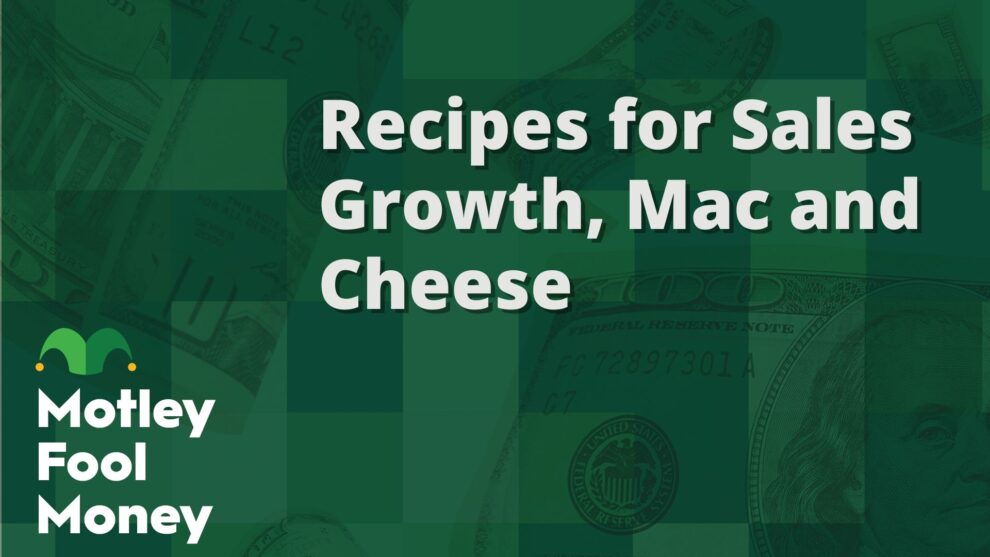
We also take a look at Rocket Lab USA, the space industry, and the difficulty of valuing speculative companies.
In this podcast, Motley Fool analyst Jason Moser and host Ricky Mulvey discuss:
- Why the Department of Justice may break up Alphabet, and if the search giant is a cheap stock.
- Quarterly results from Domino’s and its new mac and cheese offering.
Then, Motley Fool contributor Lou Whiteman joins Ricky to discuss Rocket Lab, the space industry, and the difficulty of valuing speculative companies.
To catch full episodes of all The Motley Fool’s free podcasts, check out our podcast center. To get started investing, check out our beginner’s guide to investing in stocks. A full transcript follows the video.
This video was recorded on Oct. 10, 2024.
Ricky Mulvey: Breakups are tough. You’re listening to Motley Fool Money. I’m Ricky Mulvey, joined today by mac and cheese expert Jason Moser. Jason, thanks for being here.
Jason Moser: You’re making me hungry already, Ricky. How’s it going?
Ricky Mulvey: It’s going pretty well. I want to dive into this Google Alphabet antitrust story because there was another shot across the bow from the Department of Justice. Late on Tuesday, they indicated in a court filing. They might be trying to break up that tech giant due to antitrust concerns in the online search market from the most recent filing right, “The starting point for addressing Google’s unlawful conduct is undoing its effects on search distribution.” For those just catching up, those who just landed into this story, Jason, what’s the beef that regulators have with Google?
Jason Moser: Well, in short, the Justice Department alleges that Google has, as you noted, used unlawful tactics, ultimately to stifle competition and lock advertisers and publishers into its impressive suite of tools. When you think about the strength of Google, a lot of it is in the data. Google is able to share data and customize advertising, according to usage across all of these different platforms that they own and operate. Chrome, Android, Play, YouTube, and more. What we’ve seen through the years. It’s just become a massive competitive position for this business, hence the DOJ’s focus on it now.
Ricky Mulvey: You don’t spit into the wind, you don’t tug on Superman’s cape. You also don’t want to mess with the Department of Justice, but it seems like Alphabet shareholders, I know I butchered the lyric. Don’t come out to me. I know that Alphabet shareholders really aren’t too worried about having the DOJ on the company’s tail. They’re not really sweating the breakup if you look at the stock chart. Why aren’t they concerned?
Jason Moser: Well, I think mainly because this is all just speculation at this point. There are plenty of scenarios to noodle over, and that pun was intended, by the way, Ricky. Not to mention, there is almost certain litigation. If the DOJ decides to pursue this, and then the courts end up ruling that Google and Alphabet needs to split up, there is going to be just never-ending litigation that comes from that. There’s just a tremendous amount of uncertainty in regard to this, and for now, it’s just a big game of wait-and-see. I’m a shareholder of Alphabet myself, this is not something that really is top of mind right now, but absolutely a story that will continue to follow.
Ricky Mulvey: One of the most interesting angles is one that’s not getting covered that much, I think, is that these regulators, really for the first time, are trying to have to deal with how these big tech companies use artificial intelligence. In Google’s case, they have sort of a nifty rule, which is that if you’re a publisher and you want to show up in Google search results, then you are required to allow Google to crawl your website for its own artificial intelligence product and AI training data. Here’s what it means is that if you want to show up on Google, you have to use that data which then Google can use to put into its own search results, therefore, meaning that folks might not be visiting your page to get the answers that you researched for or the articles you wrote. It seems like that might be an outcome because these regulators are saying, hey, you need to be able to opt out of that feature. You need to allow publishers to show up in the search results and be able to opt out of using their data for these artificial intelligence large language models.
Jason Moser: Well, think about things that we sign up for websites, subscriptions, whatever it may be, and oftentimes there’s a box, says, well, you want to share your data or not, and oftentimes, you say, well, I don’t really feel like sharing my data, so I’m not going to, but Google they’re in a win-win situation right now because their customers pay them the money for their service, and then they’re also getting all of that data, which, as you noted, helps them train their AI, their large language models, ultimately making the business stronger and giving an even greater competitive position. I certainly understand that perspective, and because we’re in such early days as it pertains to artificial intelligence and how it exactly is going to play out over the course of our lives and all of these companies that provide all of these different services and whatnot. This could be something that sets the tone for how this AI space is going to be regulated going for, because it’s very clear right now, there is really no regulatory framework yet. We’re all trying to figure that out, and you learn as you go along in some cases, and it sounds like that might be the case here.
Ricky Mulvey: Alphabet is a multi-headed medusa, and I know search is a lot of the business. It’s also got Cloud services. It has some artificial intelligence bets. It’s even got a self-driving car program. But when you just focus on the business of Alphabet, how important is just showing ads to people on the Internet?
Jason Moser: Well, it’s very important. It’s still ultimately the core of this business, and from its most recent 10K, they noted that they generated more than 75% of total revenue from online advertising in 2023. Now, it’s also important to note that number has come down over time as the business has evolved and built more things and looked at subscription services and Cloud services and whatever else that they’re doing. It is the core of the business still. They’re becoming a little bit less reliant on it, but 75% is still a big number. Now, I’ll also say there are signs that Google is seeding some share to competitors in the digital advertising space. You think of companies like TikTok and a little company that you may have heard of called Amazon among others. I mean, these are companies that are actually starting to take a little bit of share in that space, and according to E-Marketer, actually, Google’s share of the US search ad market is poised to fall below 50% by 2025. That would be the first time that’s happened in over a decade. Very interesting to see how this is working out.
Lou Whiteman: Some of that might be ChatGPT as we rethink how we ask questions on the Internet when you can develop a very special response that’s just for me based on the context I’ve given you.
Jason Moser: The nature of search is changing, absolutely.
Ricky Mulvey: Market’s having a good year, and right now, Google is also the cheapest Mac 7 stock, and I’m doing that just on a forward earnings basis. If we look at the free cash flow stuff, it’s in the middle with companies, I think, like Apple and Meta. A 22 times forward earnings. That’s about where the S&P 500 is, and while it’s sitting some market share in search, this is a company that owns the Internet, Jamo. Is Google a cheap stock?
Jason Moser: Cheap is such a subjective word. I would say relatively maybe so. If you look at the last 10 years, that priced earnings ratio falls on the cheaper side of how it’s been valued over the last decade. I think there are a few questions out there, of course, in regard to the DOJ, as well as AI and how search is evolving and what Google’s role will be which has led to some uncertainty, and that seems to be reflected in the stock price and evaluation today. But I would also say that often can create opportunities for investors when we’re talking about businesses as fundamentally strong as Alphabet is.
Ricky Mulvey: Let’s move on to Domino’s. They reported this morning, the world’s largest pizza chain by stores and sales. Here’s some highlights, and then you can pick from the menu to see what stands out to you. We had same-store sales. They rose 3%. That’s worse than analyst estimates, but much better than competitors like young brands, where they’re seeing same-restaurant sales decline. Domino’s announcing that they’re expecting to add 800-850 new stores globally this year. That’s down just a little bit, and then we also had 11 mentions of just the word value in CEO Russell Wiener’s remarks. What there stands out to you?
Jason Moser: Well, clearly, value is front and center in this space, and it’s not just Domino’s. it’s everyone, and QSR, quick service restaurants we were coming up with new menus to get the message across, and we noted last week in the McCormack call that they had pointed out that restaurant traffic was slowing down, particularly in the QSR space. Cooking at home was gaining steam as consumers continued to focus on the bottom line. I thought the numbers were fine. I didn’t like the world on fire, but they weren’t too bad considering the state of things. I think it was noteworthy that global retail sales growth was guided down slightly, like a percentage point from what they were targeting a quarter ago. But on the flip side, they do continue to target this 8% growth in operating income, so a business with this scale, very efficient, and they’re able to bring it down to the bottom line.
I think for investors, you look at the business like Domino’s, and it’s probably easy to forget this is a dividend-paying stock. This is a dividend payer, and it’s also one of Matty Argersinger’s dividend knights, and he just tweeted this out, I think earlier today, actually, so I encourage you to go check it out. You can click on the Link. I’ll take you to a Google Doc he has with all of these dividend nights that he calls them and his criteria is fairly simple. He’s looking over the last 10 years that the company has paid a dividend each year. Grown its dividend by greater than or equal to 10% annually, and it’s outperformed the S&P 500, Domino’s is one of those dividend nights for Matty Argersinger, and so while pizza may seem very simple, it is worth noting, I think, Domino’s has been a good long term holding, not only from the capital appreciation side but also clearly from the dividend side as well.
Ricky Mulvey: The dividend night is unique, and that it measures that market outperformance, whereas a lot of the other dividend measures of companies just looks at how consistently they pay those out. I’ll tell you, one of my favorite lines that I’ve heard of CEOC is we make our own tailwinds, and that was in the Domino’s call. You think of the value offerings, more inflation, instead of inflation advertising. But it’s funny, but they’re showing relative strength. Basically from 2015-2023, Domino’s opened the number of pizza stores that other quick service restaurant, pizza chains closed. They’re gaining share. What do you attribute to Domino’s strength here in this market?
Jason Moser: Well, you said, I think a key part of their business is in their ability to offer these campaigns, more flation campaign, for example. I think that was a brilliant one, given that we’re in this time where the conversation is so centered around shrinkflation, and this was just a campaign where customers mix and match any two or more medium two-topping pizzas. They can upgrade one of those pizzas to a large. More flation so that’s great to see too. I think there are a number of things that Domino’s has just done very well through the years. Taking advantage of that scale is one thing, but in the process, they’ve expanded their menu. They invested heavily in tech early and built a really great app. I think you put Papa John’s in the same category there. As we started doing more and more on our phones, these were businesses that were just ahead of that curve. They built an app early on. It’s something that they continue to benefit from. They attach their loyalty rewards program to that. It’s free food for frequent guests.
They’re finding every which way they can to reach the customer, whether it’s delivery or pickup or even partnerships. You remember, they recently inked that deal with Uber. It’s not a major contributor to the business right now, but it’s one more channel, and they actually have quantified the sales mix there. The sales mix from that Uber partnership was 2.7% this quarter that they just reported. That’s versus 1.9% from a quarter ago. Seen progress there. It’s a business that I think is just they’ve been very forward-thinking, and they’ve really benefited from a lot of those investments that they made early on.
Ricky Mulvey: There’s one innovation that happened with Domino’s recently that not one single analyst asked about, and that is that they launched their first new pasta since 2009. This is a five-cheese mac and cheese, and while CEO Russell Wiener is excited about this, this rollout, this new innovation, I have to ask you, Jason, how many cheeses does a mac and cheese need?
Jason Moser: It may not come as a surprise, I have very strong feelings about this. More doesn’t always mean better, and I think in this case, that applies, five is too many unless you’re really smart about the cheeses that you’re selecting, because oftentimes they just throw a lot of cheese in there and say, well, it’s just more cheese and it’s better, but you want those cheeses to be complimentary. I had very strong feelings about this. Well, I’ve got a go-to recipe that we love in our household here, and it is two cheeses in and their, cheeses that work very well together. I think rather than more, you just got to be very smart about the cheeses that you’re choosing. Hey. That’s just my take.
Ricky Mulvey: According to what I’m seeing on Reddit. Take this with the grain of salt. The five cheeses in the Domino’s mac and cheese. We’re looking at mozzarella, Asiago, Cheddar, American cheese, and Alfredo sauce. This is creating something that appears to be a little bit of just a burnt cheese sauce abomination in a tin bowl.
Jason Moser: Mozzarella doesn’t belong in mac and cheese. Don’t at me. Listen, mozzarella belongs on pizza. I’m not putting mozzarella and mac and cheese. It’s not working.
Ricky Mulvey: Surprised you went for that versus the Alfredo sauce.
Jason Moser: I’ve got strong opinions there, too, if you want to hear them.
Ricky Mulvey: I do. What are your basic tips for a mac and cheese recipe?
Jason Moser: Let’s go with first the Alfredo. Like the tradition Alfredo, rightly, you just go in with loads of parmesan and use the pasta water. Doesn’t require heavy cream and all that stuff to make it delicious Alfredo, and I’m not really sure why it’s playing a role in this mac and cheese either. But again, like I said, I mean, you get this mac and cheese recipe. I’m using Cheddar cheese. I like sharp. You can use medium and that couples with Fontina cheese. Not mozzarella, you got to go Fontina. Furthermore, I like to make pizza at home, and obviously, I’m throwing loads of mozzarella on there. But go ahead and try topping it off with a little Fontina on top of the mozzarella to add a little creamy smoky flavor that is delightful.
Ricky Mulvey: We got stock picks and cooking tips. Jason Moser, thanks for being here. Appreciate your time and your insight.
Jason Moser: Thank you.
Ricky Mulvey: As you can tell Jason’s pretty passionate about food, we’ve got a link to his mac and cheese recipe in today’s show notes. Up next, I’m checking in on a few space company stocks with Motley Fool contributor Lou Whiteman. We also talk about how investors can approach highly speculative companies.
Today’s show is sponsored by Vanta rhymes with Santa. Whether you’re starting or scaling a company demonstrating top-notch security practices and establishing trust is more important than ever. Vanta automates compliance for SOC 2, ISO 27001, GDPR, and more, saving you time and money while helping you build customer trust. Plus, you can streamline security reviews by automating questionnaires and demonstrating your security posture with a customer-facing trust center all powered by Vanta AI. One use case, they have vendor risk management, automate vendor onboarding, risk assessment, and remediation, so you can spend less time on vendor reviews. Over 7,000 global companies like Atlassian Flow Health and CRA use Vanta to manage risk and prove security in real-time. My audience gets a special offer of $100 off Vanta at vanta.com/fool. That is V-A-N-T-A.com/fool for $100 off.
If you’re a publicly traded speculative space company, then you’re probably having a good year. Rocket launcher, Rocket Lab is up about 77% year to date. Intuitive Machines, a space exploration company that already has a Lunar Rover cooking. That’s up 200% in AST space mobile, a satellite designer looking to fill in coverage gaps for telecom companies is up 400%. Lou, basically, everyone besides Virgin Galactic is having a great 2024. I guess let’s set the table with this. Are these companies just making impressive strides? Is this a low-interest rate speculation party, like we saw in 2019? Maybe it’s a mix of both. What do you think?
Lou Whiteman: Yes, I’m going to push back at the premise just a tiny bit the idea that everyone’s having a good year because you mentioned Virgin Galactic momentous, which is going to be a space tow truck concept. They’re down 75% and basically trading at a Calt Cushion evaluation. Satellite Merca Terran Orbital was just sold to Lockheed Martin at about 95% below its high from 2022. There are winners and losers. That said, I think your premise is correct. A few years ago, when rates were low and money was basically free, I allowed for a lot of experimentation when it came to space. A lot of concepts that were intriguing, but perhaps tough to justify economically got funded, and now I think what we’re seeing is a bit of a shakeout where the winners are starting to pardon to pon take off, and the losers are falling off, where these science experiments are playing out.
Ricky Mulvey: The company I own personally is Rocket Lab, and I’m going to paraphrase this. I owned it as ”Idiot Insurance Policy” because I think Space tech is real. I think it’s going to be a significant part of the economy throughout my lifetime. But also, I don’t know how to value this thing. I don’t know if it’s going to be the real winner as all of these launch companies continue to fight against each other, especially as it competes against SpaceX, and while you can see commentary that it’s going to generate more cash flow if the neutron rocket is more reusable than what they’re doing now with just reusable engines. I can’t tell you how that plays out in the valuation. I know you follow this space a little bit more closely. How do you think about valuation for these companies that don’t really have good historical comparisons?
Lou Whiteman: Full disclosure, Rocket Lab is the one I own too, so I definitely happy to talk about it. You’re correct, though. This is a lottery ticket, not fundamental investing, and the short answer is, I don’t think you can be a value investor and really get your hands around it today, and certainly, that’s not how they’re valued right now. They’re valued on potential. Rocket Lab is benefiting from actually doing St launches. They’re actually, most of these start-ups are it’s still PowerPoint, more than anything, so they are getting evaluation boost from actually just proof of concept. But a lot of it is what they can become, and the real long-term potential is for them to become this one-stop shop for non-space companies looking to get into space.
A few years ago, Morgan Stanley estimated the global space industry could generate $1 trillion in revenue by 2040. I’m kind of dubious about that number, but if we’re going to get anywhere close to that, it requires a lot of companies that you don’t think about with space today. You don’t associate with space to decide they want to have satellites or they need to be in space. Those companies are not going to hire a team of rocket scientists to do it all in-house. What Rocket Lab is trying to build is they want to go to you, the non-space customer who wants to get into space, and say, we can design your satellite, we can build it, we will launch it, and then we’ll monitor and maintain it. You can outsource your entire space presence to them, and I think that’s the killer app, so to speak if the space market develops into what people hope it is, this company that can just manage it all for you. That’s what they’re valued on is based on this idea that if this reality comes true, Rocket Lab is going to be at the center.
Ricky Mulvey: It’s also a story I really like with the founder Peter Beck, and while he’s from New Zealand, it’s almost the most American dream story you can find, where he was attaching engines to bikes, like JetPack bikes. He dropped out of college. He just wanted to build rockets, and now here he is getting a contract from NASA to go retrieve rock samples from Mars, from the Martian surface, and bring them to Earth. It’s a story where he’s built this business pretty much on sheer force of will, starting with no money. We can get to the business side, but are you hoping we find signs of past life on Mars?
Lou Whiteman: The risk of being labeled that guy, I’m 100% convinced there was and perhaps is life on Mars, and they will eventually find and back that up, and I’m not talking about little green men here. I don’t really believe in that, but, these single-cell organisms, whatever it is. Yeah, I think that probably that was, if not, is, and I think at one of these times, we’re gonna figure that out.
Ricky Mulvey: Maybe not little green men, but we’ll have a different conversation about Ti Tax and little gray men off Air loo. Why do you think it wasn’t just SpaceX getting this contract, though? Why do you think we’re seeing NASA and government agencies really spreading the pot around?
Lou Whiteman: Well, for one thing, SpaceX has a lot on their plate right now. They’ve gotten plenty of rewards, and they did get awards related to this. But look, the government has a long history of not placing all of their bets with one company, and that’s certainly what’s going on here. The interesting thing for me here from the Rocket Lab point of view is, Rocket Lab, this is following the SpaceX model, and the SpaceX model has worked out very well for them. SpaceX figured out early on if they could get NASA and other government agencies to fund a lot of what they’re doing R& DIYs, that broadens their pot and allows them to do a lot more. SpaceX has done a great job of building their business and building all of Elon Musk’s big dreams based on this foundation, the bedrock of government contracts, and it’s important to note, Ricky, for all these companies, they’re getting involved in government contracting because, for all this talk of $1 trillion market, the launch market, in particular, has remained pretty static since the beginning of the Cold War, say the last 50 years or so. Perhaps in time, commercial demand will surge, and people sure do hope that materializes. But for now, if you want to be a viable rocket company, the government is going to be a major source of revenue. They are a big chunk of that flat market. You need to build good relations with these customers. You need to get on their list of reliable customers, and that’s how you get that steady stream that funds all of these dreams that Peter Beck, Elon Musk, Jeff Bezos, all these people have.
Ricky Mulvey: What are the commercial applications you’re watching if the launch business is staying pretty static then?
Lou Whiteman: It really is, and in a way, it’s a race to be the most efficient at that capacity. You talked about Peter Beck. One of his genius is, to some extent, it’s easier to make rockets bigger. all you have to do is just add more power, more thrust, and you can do bigger and bigger. Making it smaller is devilishly hard, and what Rocket Lab how they got their start was to make a smaller version. It can’t take the heaviest things up in the space, but it’s much more efficient and therefore cost-efficient. The reusable rockets better at sizing the rockets to the payload, getting costs down, and then to some extent, companies like SpaceX will start creating demand by building subsidiaries that need launch capacities. That’s the way they’ve made money now. There is a big enough market for at least some of these players to coexist. SpaceX Rocket Labs, United Launch. I don’t know if there’s a big enough market for everybody who would like to do this. We talked about winners and losers at top. There are going to be more winners and losers up ahead, I think, unless we very quickly see demand just go through the roof, and I’m skeptical on the short term if that’s happened. In the long term, who knows?
Ricky Mulvey: Besides the Mars mission from Rocket Lab, what storylines are you watching for that company in the years ahead?
Lou Whiteman: You mentioned the neutron rocket. I think that is so important for this to come off because it does open up bigger capacity missions at a cost of at an affordable price, so that’s very big for them rounding out the business. The other thing is, as I said, the one-stop-shop approach if this company’s really going to make it. They could be the rare SPAC success story. They started out as one of these SPACs. We’ve had a lot of high-profile failures. Virgin Galactic was also a SPAC. Most of the companies I mentioned started SPACs. But what that SPAC did for Rocket Lab is it created a huge pile of cash that they could put to work as they needed. They have acquired satellite design. They have acquired some of this kind of satellite monitoring and maintenance capability. Long term, their ability to both expand their basic launch presence, which is the core of the business, but also build out those related capacities so they can be for the customer, just the only call you have to make. That’s going to be the key to this really being a sorry, a rocket ship. I have to say it.
Ricky Mulvey: I did mention some companies, not just failures, ones that are doing pretty well. AST Space Mobile, the one that has some contracts with large telecom providers to essentially give you data where you don’t get data right now on your cellphone. Intuitive machines I’ve been looking more into, just because I think moon stuff is really cool, and I didn’t even realize. We got another lunar rover on the moon, and I’m glad that that’s happening after several decades of delay. There’s also Spire Global, which is a We had the CEO on the show Peter Platzer. They do very high-quality weather data and predictions to deal with NVIDIA, where they’re essentially sharing their data for their planet Earth digital twin that NVIDIA is trying to build. All of these are incredibly speculative, but any of these that you’re looking into for a speculative stab during this low interest rate party.
Lou Whiteman: I’ll pick on a couple. You mentioned intuitive machines. I will say about them. They have some great minds there, and they are really doing interesting stuff. The question is going to be, I think, just long-term revenue with them, and they are going to have to zig and zag and figure out exactly what the business is. But as a research lab, they are top-notch, and I say, there was a company called Dynamics, a few years ago that merged into one of the bigger contractors. At the very least, you can see that with them. AST is fascinating because this is where we’re talking about science projects, and we’re talking about just, let’s see if this works, and then we can make a business. They have, I think, exceeded most scientists’ expectations in terms of proof of concept, but they have a huge spending plan. If they are going to actually get the satellites into Earth and actually be this terrestrial cell service not rival, but compliment whatever it is. That I hate to I hate to dismiss them because they have come so much further than I would have thought, but do not underestimate the costs that they have up ahead. Again, whatever you buy here, just keep it a small part of a diversified portfolio because not saying they can’t work out, but you certainly don’t want to bet the retirement on something as complicated and as uncertain as space.
Ricky Mulvey: Before we go, I wanted to plug that Motley Fool Money has been nominated for a Signal Award for Best Money and Finance Podcast. Do you like the show, get some value from it? We appreciate it if you cast a vote for us. I’ll drop a link to do so in today’s show nos.
As always, people on the program may have interests in the stocks they talk about. Motley Fool may have formal recommendations for or against, so don’t buy or sell anything based solely on what you hear. I’m Ricky Mulvey. Thanks for listening. We’ll be back tomorrow.









